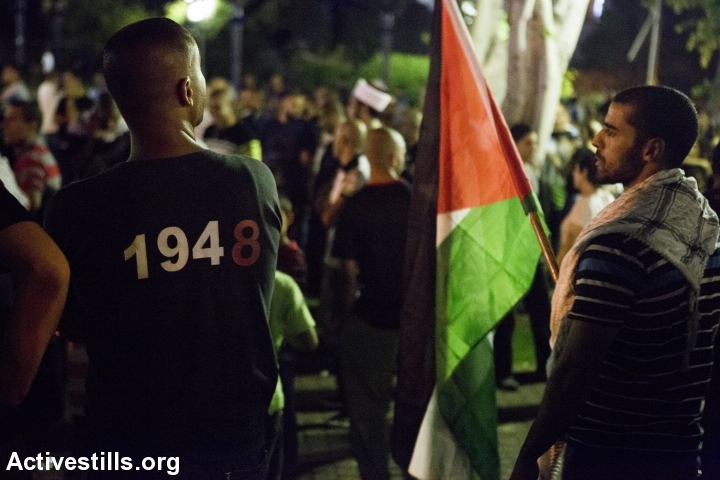A recent campaign against Palestinian journalist Makbula Nasser, who was attacked on the front page of Israel’s most-read newspaper, was meant to strike fear in the hearts of Palestinian citizens of Israel — the fear of speaking out. That may have worked with previous generations.
Do you remember the neighborhood bully? The scary one who would hit anyone who happened to be in the wrong place at the wrong time? Do you also remember what best characterized that bully? An ingenious lack of sophistication that you could see his next move coming from a mile away.
Earlier this week, Israel Hayom, Israel’s most-read newspaper, published a front-page political attack against Makbula Nassar, a Palestinian journalist, blogger at Local Call, and regular contributor to +972 Magazine. The attack-masquerading-as-journalism dug up old Facebook statuses in order to paint Nassar, who was recently hired to head a state-run road safety campaign for Israel’s Arab population, as a “prominent activist against the state.” Within a few hours, a senior government minister demanded she be fired.
Just like the neighborhood bully, Israel Hayom’s offensive against Nassar was embarrassingly transparent — she was merely a convenient distraction, and more fuel to feed the nationalist mechanisms of hatred toward anyone who thinks differently than “us.” In this story, however, Israel Hayom is more like an arch-bully in a neighborhood full of smaller bullies. The rest of the Israeli media isn’t much better, but this bully has a rich daddy — American casino baron Sheldon Adelson.
We, Palestinian citizens of Israel, need to understand that instead of simply lamenting our fate, and the fact that this particular bully’s patron will in all likelihood continue pouring his endless gambling fortune into his pet hate-mongering tabloid, we need to put these attacks into their proper proportions. We cannot allow this type of persecution to make us afraid.
Just like you can’t surrender to the neighborhood bully, we cannot let Adelson’s tabloid win, either. One of the primary goals of a witch hunt against whichever unfortunate Arab finds her or himself in the crosshairs is to sew fear in the hearts of the rest of Israel’s Palestinian citizens, god forbid they start to believe they are human beings equal to Jewish Israelis or something crazy like that.
My heart goes out to every Palestinian citizen of Israel who happens to be a civil servant — or to those who work in majority-Jewish companies (like most employers in Israel) — and who, after seeing the persecution of other Arabs, is terrified that his or her own voice might accidentally be heard, thereby putting their livelihood and the livelihood of their children at risk. I have nothing but empathy for them.
That fear comes from the exact same place as my aunt, when she tells me, “don’t go to protests, the Shin Bet will destroy your life.” Those fears are borne of real stories of real lives under an institutionalized thought police that has been in place in Israel since the time of the Nakba in 1948, irrespective of whether a right-wing or “leftist” government was in power.
We survived the military government, we can survive this too
Members of the first and second generations of the Nakba have experienced first-hand far-more serious and violent persecution during the time of the military government Israel imposed on its Arab citizens from 1948 until 1966. It’s only natural that they would pass down their fears to the third generation — my generation. But against all odds, those fears have slowly faded from the younger generation and its national identity. That fear, at least among many of us, was not passed down.
The fear borne of a history of being silenced, even when that history is real and actually occurred, doesn’t infect those who ask questions, and who question the establishment’s mythological reach. And all those who are not afraid are the same people who are demanding — either through writing or speaking on any available stage or platform — an end to the occupation and to the injustices being perpetrated against their people. They are the same people who understand that they must make heard the voices of all those who are still afraid. They are the Makbula Nassers of the world. They are here, and their numbers are growing.
All bullies and thugs collapse eventually. At some point, their own fears, doubts, and frustrations that drove them to become bullies in the first place eventually eat them alive. Instead of giving into bullies in the media and losing hope, remember that there also exists an independent, activist, and honest media — a type of journalism that doesn’t hesitate to amplify the voices of all those forced into silence.
All of us at +972 Magazine and Local Call stand behind our friend Makbula, and stand against the preposterous political persecution and harassment she is facing. It is for all of those Arab employees and civil servants who live in fear of similar persecution that we will continue to make our voices heard, with the hope that the fear of speaking out is eventuallyerased from the heart of every Palestinian.
A version of this article was first published in Hebrew on Local Call. Read it here.


